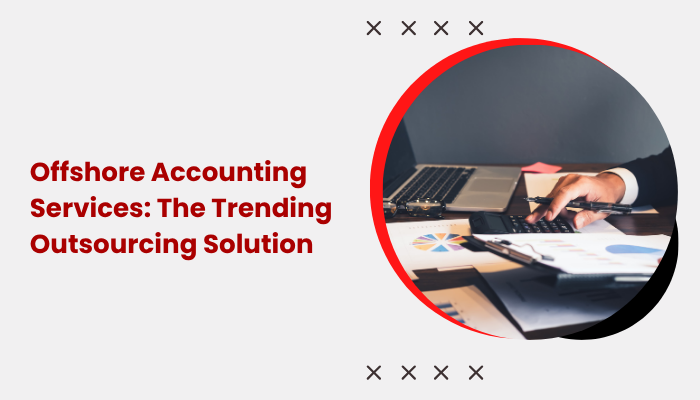In an increasingly competitive global economy, cost-effectiveness and operational agility are vital. More companies- especially startups and SMEs- are outsourcing financial operations to international professionals. Offshore accounting services aren’t just about saving money anymore. They’ve matured into a strategic, scalable, and compliance-driven approach to managing business finances.
Why Offshore Accounting Services Are Gaining Ground
Offshore accounting has come a long way from being a budget solution. It’s now a premium strategy employed by companies to access top-tier expertise, ensure 24/7 operations, and align with international financial standards.
Some compelling reasons why businesses embrace it include:
-
Access to a global talent pool: Tap into seasoned professionals from countries like India, the Philippines, or Eastern Europe.
-
Scalability without growing pains: Easily adjust your team’s size and skills according to your business cycle.
-
Time zone advantages: Continuous workflows across borders enhance productivity.
Types of Services Offered by Offshore Accounting Providers
Offshore accounting isn’t one-size-fits-all. Providers specialize in diverse financial areas, allowing companies to outsource entire departments or specific tasks.
Common services include:
-
Bookkeeping and general ledger maintenance
-
Payroll processing and compliance
-
Accounts payable and receivable
-
Budgeting, forecasting, and financial analysis
-
Tax preparation and filing
-
Audit preparation support
-
Financial statement preparation
-
Cloud accounting and tech integration
Providers often customize packages depending on the client’s software and industry, ensuring seamless integration into business operations.
Cost-Efficiency Without Compromise
Perhaps the most immediate and measurable benefit is financial. Hiring in-house accounting teams can be expensive. From salary to benefits to infrastructure, costs quickly add up. Offshore services drastically cut those expenditures.
Let’s consider a scenario: hiring a U.S.-based CPA may cost upwards of $75,000 annually. The same service offshore- maintaining quality and qualifications, might cost 40–60% less. The savings go beyond salaries. Companies also save on:
-
HR overhead
-
Office space and equipment
-
Training and certifications
-
Employee insurance and benefits
These savings empower reinvestment into growth areas like marketing, product development, or market expansion.
Enhanced Focus on Core Business Goals
When accounting operations are offloaded, internal teams can concentrate on revenue-generating functions. Business leaders can redirect their attention to strategic planning, customer acquisition, and innovation.
This operational clarity benefits startups and fast-growing enterprises immensely. By delegating complex and time-consuming accounting tasks, they speed up decision-making and avoid getting bogged down in day-to-day transactional minutiae.
24/7 Operations and Time Zone Benefits
Partnering with teams in different parts of the world allows round-the-clock work. Your books can be reconciled overnight while your U.S.-based team sleeps. Come morning, you’re ready with updated financial insights.
This continuity accelerates monthly closing cycles, ensures real-time reporting, and boosts financial responsiveness, essential for businesses managing large inventories, frequent transactions, or complex tax structures.
Technology-Driven Accounting Integration
The use of cloud-based accounting tools has made offshore services more accessible and secure. Providers now integrate with platforms like:
-
QuickBooks
-
Xero
-
Zoho Books
-
NetSuite
-
FreshBooks
Moreover, automation tools such as Hubdoc, Receipt Bank, and Gusto enhance real-time data sharing and transparency.
Cybersecurity is also a high priority. Leading offshore firms employ encrypted networks, multi-factor authentication, and data redundancy protocols to safeguard sensitive financial data.
Compliance and Global Standards Alignment
A common concern is whether offshore teams understand domestic regulations. Top-tier offshore accounting firms invest in regular training and certification to align with:
-
GAAP (Generally Accepted Accounting Principles)
-
IFRS (International Financial Reporting Standards)
-
Local tax codes and payroll regulations (depending on the client’s country)
Moreover, many firms offer region-specific experts to ensure compliance and avoid costly penalties.
Challenges and How to Overcome Them
Despite the benefits, outsourcing accounting overseas isn’t risk-free. Here are common challenges and strategies to tackle them:
Communication barriers:
Mitigate through clear onboarding, standardized documentation, and collaboration tools like Slack, Asana, or Zoom.
Data privacy concerns:
Ensure NDAs are signed. Work with ISO-certified providers who follow GDPR, SOC 2, or other relevant privacy frameworks.
Cultural differences:
Invest time in relationship-building. Schedule regular check-ins, virtual meetups, and transparent feedback loops.
Loss of control:
Use cloud dashboards and reporting software to maintain visibility. Set KPIs and review progress weekly or monthly.
Industries That Benefit Most from Offshore Accounting Services
Some sectors are naturally aligned with the strengths of offshore financial management:
-
E-commerce: High transaction volumes and global customer bases benefit from streamlined offshore bookkeeping.
-
Tech Startups: These often require scalable, agile accounting support without long-term commitments.
-
Manufacturing: Complex inventory and cost accounting demand specialist expertise, often available offshore.
-
Real Estate: Portfolio management and regulatory reporting are well-handled by experienced offshore teams.
-
Professional Services: Law firms, marketing agencies, and consultants can optimize financial operations externally.
Best Practices for Working with Offshore Teams
To maximize success:
-
Choose a partner with a proven track record and verifiable references
-
Define the scope of work and deliverables clearly
-
Set up regular communication and reporting frameworks
-
Use shared platforms for documentation, invoicing, and data exchange
-
Pilot a small project before scaling the relationship
When Should You NOT Consider Offshore Accounting?
Outsourcing isn’t for everyone. You might reconsider if:
-
You’re dealing with extremely sensitive financial data and lack the infrastructure to secure it
-
You prefer high-touch, in-person collaboration with your accounting team
-
Your industry mandates strict local controls over financial operations (e.g., highly regulated defense sectors)
Closing
Offshore accounting services have redefined how modern companies manage financial operations. No longer just a cost-saving tactic, this outsourcing trend offers businesses efficiency, access to global expertise, and 24/7 operations. When done right, it fosters focus, compliance, and long-term growth.
Before jumping in, consider your business size, needs, and industry. Partner with the right offshore team, and you’ll transform your accounting function into a growth enabler.
Click here to read more articles: insidetechie.xceltec.in
 :
https://www.pinterest.com/inveduss/
:
https://www.pinterest.com/inveduss/

